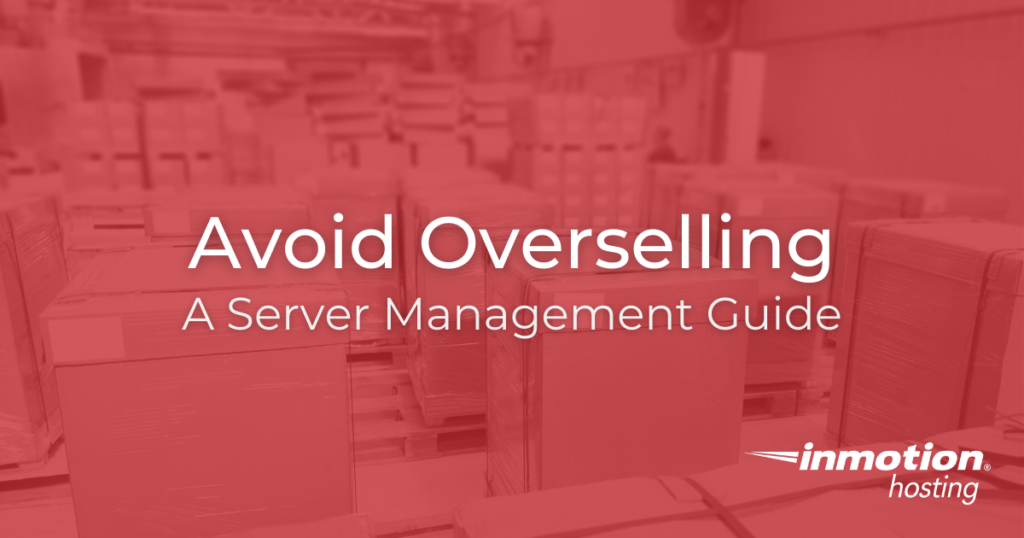Table of Contents

If you are a reseller, web designer, or simply running multiple cPanels in WebHost Manager (WHM), it’s important that you avoid overselling your account or server resources. In the context we’re looking at here, overselling simply means allowing cPanel accounts to use more bandwidth or disk space than the server can actually provide, leading to slowdown and potential downtime until you fix the issue. Below, we’ll cover some common causes of this problem and how you can avoid it to keep your clients’ accounts running smoothly.
How Overselling Happens
WebHost Manager (WHM) lets you create new cPanel accounts — the exact number varies depending on your hosting plan. When you have a VPS Hosting Plan or a Dedicated Server, you can create cPanel accounts that offer unlimited bandwidth and unlimited disk space. The thing is, declaring an account’s bandwidth or disk space unlimited simply means that cPanel won’t automatically step in if the account starts using up an enormous percentage of the server’s resources.
Imagine a server with 75GB of available disk space — an unlimited account can’t upload 100GB of data to the server just because it’s an unlimited account. That account would reach the server’s limits, likely crashing the server in the process.
If you plan to create reseller accounts on your existing account, be sure to consult cPanel’s official documentation on overselling.
Common Problems
If overselling is a bad idea, why does it happen? The truth is, setting bandwidth and disk space on your cPanels to ‘unlimited’ makes things really easy. If one of your clients’ sites suddenly gets popular, you don’t have to worry about switching around bandwidth across multiple accounts to balance server load. If one client needs to upload a thousand high-quality images for their real estate site, they don’t need to spend time asking you to allocate more disk space.
It works great — until something breaks. It usually goes something like this: a web designer has a powerful server with a lot of bandwidth and disk space. All of that designer’s customers have relatively small sites with minimal activity. Leaving everything set to ‘unlimited’ seems safe.
What goes wrong? Common culprits are a denial of service (DDoS) attack, unusual spikes in bot/crawlers, or even a sudden influx of legitimate traffic spiking bandwidth for an account. Automated VPS backups can also grow exponentially and use much more disk space than expected.
Using up all of your server disk space will require you to go in and manually clear out files until the server is usable. When you have no free disk space, every step of this process is slower than you would expect because you have compromised your server’s ability to run properly. A bit of prevention will save you hours of tedious file management. Using up all of the bandwidth is usually a more temporary problem, but repeated attacks on one account could end up harming everyone on your server.
Avoiding Overselling
Setting an account to unlimited is like handing someone a pile of blank checks — it’s fine if you know for sure that the person running the cPanel account is responsible and that site traffic is limited. Are you, personally, running that unlimited cPanel account? Are you ready to step in at a moment’s notice to fix a problem if something unusual happens?
When you are giving cPanel access to a client, it’s a good idea to set reasonable disk space and bandwidth limits. This helps prevent a crisis situation from affecting other accounts and can easily be adjusted later in WHM.
If an account is under attack — be it a DDoS or robots and crawlers using up too much bandwidth, follow appropriate troubleshooting procedures for the problem you are dealing with. Consider setting up a CDN like CloudFlare for that account. Then, adjust your account packages and feature lists in WHM to decrease the chance of overselling an account in the future.
Add value to your web design business by becoming a reseller. Offer web hosting, email, and domain registration to your services with our Reseller Hosting plans!
Fast NVMe SSD Storage
Security Suite, Free SSL and Dedicated IPs
Unlimited Bandwidth

How should you determine what limit to place?
That’s a good question, Wayne. Honestly, the needs of each business and each web designer vary so much from one scenario to another, it’s hard to give a rule on how much to allocate. Every time I think of one, I immediately think of three or four situations where it would not apply.
Purely from the perspective of someone who fixes disk space issues (as opposed to someone who has been a freelance reseller), I’d start with dividing your account’s total disk space by the number of accounts you expect to have under ideal circumstances, then using a half or a third of that. You can always add more as needed, but this gives you flexibility in case you suddenly need to make backups of everything, and some spare disk space if you ever need to add something to a particularly active account. Of course, if you only plan to run one high priority site, you could assign half of the available disk space on the server to it – or more.
As for bandwidth, I’d start off in the early months of your account closely monitoring usage through cPanel, then adjust accordingly/as needed. Apologies if that sounds a bit vague, it’s just that bandwidth needs can vary enormously depending on site design, traffic, peak hours, etc. Still, hope that helps a bit!